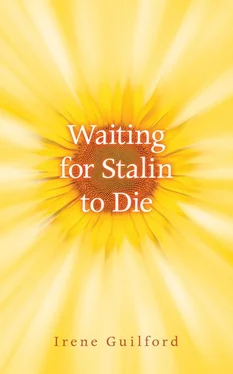The Bishop sent a polite dry response. The Church had many demands on its purse.
Father Geras took to phoning Bishop Bennett once a week. He informed the Bishop with regret that Mrs. Vitkunas was not getting any better. He pointed out that there would only be more like her. He mentioned the Church’s role as custodian. Describing souls tossed about by life and with no imminent prospect of returning home, he conveyed their hope of resting among compatriots rather than strangers.
The Bishop’s secretary intercepted the calls. Father Geras must be patient.
Father Geras went to Montreal to see the Bishop in person. Waiting in the Bishop’s antechamber, he tried to imagine the life of the young secretary priest. A buzzer on the desk rang. The secretary nodded his permission. And entering the Bishop’s presence, Father Geras saw a shrunken old man sitting behind an ornate desk and sunk beneath heavy robes.
“The Church wants to help, of course it wants to help,” the Bishop said, sighing with careful patience at this country priest who did not appreciate the delicate dilemma of a Bishop caught between parishes and politics. “But Our Holy Mother Church has many priorities, many demands upon its purse. It cannot be responsible for everyone who comes here from Europe. This is purely a local matter. You and your people must raise the money.”
“Surely you mean our people,” Father Geras said. “Your Holiness.”
Mouth puckering, the Bishop said he would see what he could do.
The letters and phone calls kept coming. Wearying of this most polite of squeaky wheels, Bishop Bennett set his own wheels in motion. The right words were put in the right ears. Funds were shifted and reassigned. Returning to Montreal to pick up the cheque, Father Geras bent to kiss the Bishop’s ring.
“Thank you, Your Excellency. We will never forget you. You will be remembered forever.”
“Yes, yes, I suppose so,” Bishop Bennett said, waving him away with a languid air.
Father Geras went back to Mr. Lambert. If the church would provide half now, would Mr. Lambert consider selling? Regrettably Mr. Lambert could not. He needed the full purchase price.
“I’m sorry, Father,” he said in genuine sympathy, “but I must consider my sisters Violet and Maud. I must take care of my family.”
And I must take care of mine, Father Geras thought. You can’t imagine what it’s like to be in a new country, alone, while your family suffers back home. Well, you are lucky. But we will find a way. And shaking Mr. Lambert’s hand, he thanked him for his time.
The community continued raising money. Women baked cakes, selling them slice by slice after mass. Men whittled wooden figurines, selling them to one another. They bought raffle tickets for books and linens they did not need and could not afford. And as nickels, dimes and quarters grew to dollar bills, Father Geras was humbled by the spirit of a people who had lost everything but continued to give.
Father Geras had never met Joe Druska, a non-church-goer who kept to himself. Having come in the previous wave of the 1920s, he was a senas imigrantas, an old immigrant. He was a bachelor living alone. His age and his past were unknown. Landlord of a house on Dundas, he had a reputation for being solitary and cantankerous.
Father Geras waited on the doorstep, unsure of his welcome. The old immigrants resented the newcomers who had crowded them out of a church that could only hold two hundred. He must be very lonely, Father Geras thought. Perhaps more than most. And peering through the window in the door, he saw a shadow shifting behind the bubble glass.
Joe Druska peered back at Father Geras with distaste. A tall man with fierce eyebrows and an equally fierce personality, he had no fondness for the church. They had not allowed him to divorce his wife. What good was a wife to him back home in Lithuania? He would be tied to the woman forever.
“What do you want, Father?” Joe Druska said, opening the door. He neither minced words nor held with social graces.
“You don’t come to church. So I’ve come to see you.”
“The hell you have. You’ve come for money.”
“I won’t pretend. The church always needs money. Right now it needs money for a cemetery. But that’s not the only reason I’ve come.”
Joe Druska grunted. At least this priest gave a straight answer.
“A cup of tea, Father?” he asked. He was not about to give money but a cup of tea he could manage. And he would let him know just how he felt about the church and its dealings.
Father Geras stepped inside, removing his hat. Looking around the hallway, he noticed the highly-polished wood. He followed Joe Druska to the small well-kept kitchen. No negligence here, he thought. The man had pride.
“You keep a good house.”
“Tenants with no complaints are tenants who pay rent.”
“Then you must be a rich man,” Father Geras said with a good-natured smile.
He’s brazen enough, Joe Druska thought. I’ll hand him that.
“Not as rich as some. Tea? Or something stronger? You priests like a nip now and then. It must be that Communion wine. And I’m in the mood for a little something myself.
“I’ll keep you company. Just don’t tell the boss upstairs.”
Despite himself, Joe Druska had to laugh.
Joe Druska moved around the kitchen with the familiarity of a bachelor existence. Setting a bottle of rye on the table, he filled two shot glasses. His experienced hand knew just when to stop. The liquid shimmered at the rim. Lifting their glasses in a toast, they drank.
“Why don’t you ever come to church, Joe? Perhaps you’re a Communist?”
“Never! I don’t like company.” He had toyed with the idea once, back in Lithuania. Magda had disabused him of it, as she had disabused him of most things.
“Ah.”
Father Geras waited.
“So how is parish life, Father?” Joe Druska said. Not that he cared but a man had to have some kind of conversation with a drinking companion. And he felt a sliver of respect for a priest who, despite rumours about politics, had come to see him.
“I can’t pretend. They’re pretty bad. We have no place to bury people. Not even a place to bury you.”
“Oh, don’t you worry about me,” Joe Druska said, filling the glasses again.
“But I do worry. I worry about everyone. Even about you . If I didn’t, who would?”
Joe Druska knocked back another shot, wiping his mouth with the back of his hand.
“What about your friend upstairs?”
“He worries, too. But it’s my job to find the money.”
Joe Druska felt the uncomfortable prickle of something he couldn’t identify.
“I can’t help you.”
“And why not?” Father Geras said, looking Joe Druska straight in the eye.
“Because the church has done me no favours,” Joe Druska said, holding his gaze.
“Tell me about it.”
So this is confession now? Joe Druska thought. Well, he would tell the story. He’d tell it so that this priest would go away. He’d tell it so that he wouldn’t be bothered again. He wanted to be left alone.
“It was a long time ago.”
“In that case begin at the beginning.”
“In that case let’s have another drink,” Joe Druska said, filling their glasses once more.
Joe Druska had come to Canada as a young man, leaving behind his wife and two-year-old daughter. Finding a job in a tanning factory, he scraped bits of raw flesh off stiff hides. He prided himself on sticking with a job that other men couldn’t abide. The difficult unpleasant work paid well. And denying himself even drink, he had saved and saved.
Читать дальше












